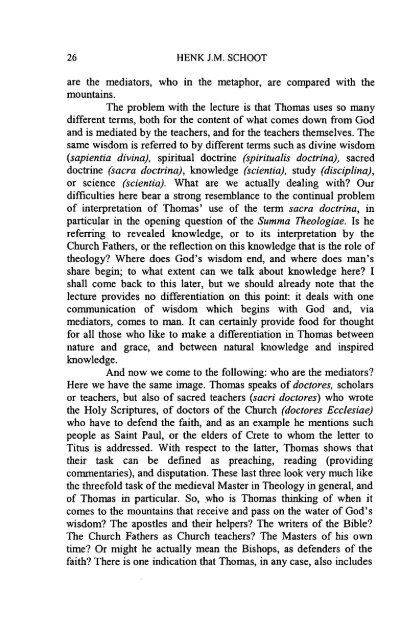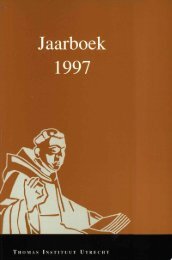Jaarboek Thomas Instituut 2006 - Thomas Instituut te Utrecht
Jaarboek Thomas Instituut 2006 - Thomas Instituut te Utrecht
Jaarboek Thomas Instituut 2006 - Thomas Instituut te Utrecht
Create successful ePaper yourself
Turn your PDF publications into a flip-book with our unique Google optimized e-Paper software.
26 HENK J.M. SCHOOT<br />
are the mediators, who in the metaphor, are compared with the<br />
mountains.<br />
The problem with the lecture is that <strong>Thomas</strong> uses so many<br />
different <strong>te</strong>rms, both for the con<strong>te</strong>nt of what comes down from God<br />
and is media<strong>te</strong>d by the <strong>te</strong>achers, and for the <strong>te</strong>achers themselves. The<br />
same wisdom is referred to by different <strong>te</strong>rms such as divine wisdom<br />
(sapientia divina), spiritual doctrine (spiritualis doctrina), sacred<br />
doctrine (sacra doctrina), knowledge (scientia), study (disciplina),<br />
or science (scientia). What are we actually dealing with? Our<br />
difficulties here bear a strong resemblance to the continual problem<br />
of in<strong>te</strong>rpretation of <strong>Thomas</strong>' use of the <strong>te</strong>rm sacra doctrina, in<br />
particular in the opening question of the Summa Theologiae. Is he<br />
referring to revealed knowledge, or to its in<strong>te</strong>rpretation by the<br />
Church Fathers, or the reflection on this knowledge that is the role of<br />
theology? Where does God's wisdom end, and where does man's<br />
share begin; to what ex<strong>te</strong>nt can we talk about knowledge here? I<br />
shall come back to this la<strong>te</strong>r, but we should already no<strong>te</strong> that the<br />
lecture provides no differentiation on this point: it deals with one<br />
communication of wisdom which begins with God and, via<br />
mediators, comes to man. It can certainly provide food for thought<br />
for all those who like to make a differentiation in <strong>Thomas</strong> between<br />
nature and grace, and between natural knowledge and inspired<br />
knowledge.<br />
And now we come to the following: who are the mediators?<br />
Here we have the same image. <strong>Thomas</strong> speaks of doctores, scholars<br />
or <strong>te</strong>achers, but also of sacred <strong>te</strong>achers (sacri doctores) who wro<strong>te</strong><br />
the Holy Scriptures, of doctors of the Church (doctores Ecclesiae)<br />
who have to defend the faith, and as an example he mentions such<br />
people as Saint Paul, or the elders of Cre<strong>te</strong> to whom the let<strong>te</strong>r to<br />
Titus is addressed. With respect to the lat<strong>te</strong>r, <strong>Thomas</strong> shows that<br />
their task can be defined as preaching, reading (providing<br />
commentaries), and disputation. These last three look very much like<br />
the threefold task of the medieval Mas<strong>te</strong>r in Theology in general, and<br />
of <strong>Thomas</strong> in particular. So, who is <strong>Thomas</strong> thinking of when it<br />
comes to the mountains that receive and pass on the wa<strong>te</strong>r of God's<br />
wisdom? The apostles and their helpers? The wri<strong>te</strong>rs of the Bible?<br />
The Church Fathers as Church <strong>te</strong>achers? The Mas<strong>te</strong>rs of his own<br />
time? Or might he actually mean the Bishops, as defenders of the<br />
faith? There is one indication that <strong>Thomas</strong>, in any case, also includes








